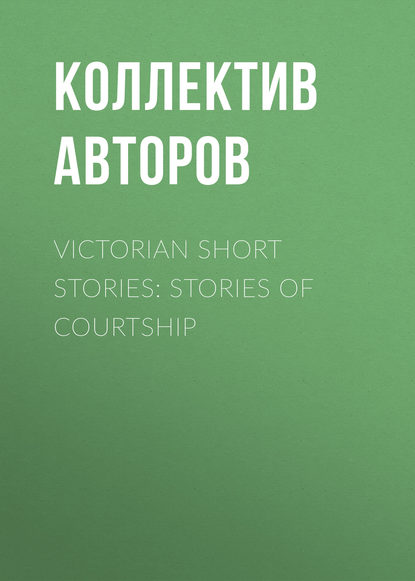По всем вопросам обращайтесь на: info@litportal.ru
(©) 2003-2024.
✖
Victorian Short Stories: Stories of Courtship
Настройки чтения
Размер шрифта
Высота строк
Поля
'Well, surely you don't want to outrage everybody,' she said, pouting.
At first he was outraged himself. What! She who had been ready to flutter the world with a fantastic dance was now measuring her footsteps. But on reflection he saw that Mrs. Glamorys was right once more. Since Providence had been good enough to rescue them, why should they fly in its face? A little patience, and a blameless happiness lay before them. Let him not blind himself to the immense relief he really felt at being spared social obloquy. After all, a poet could be unconventional in his work—he had no need of the practical outlet demanded for the less gifted.
VI
They scarcely met at all during the next six months—it had, naturally, in this grateful reaction against their recklessness, become a sacred period, even more charged with tremulous emotion than the engagement periods of those who have not so nearly scorched themselves. Even in her presence he found a certain pleasure in combining distant adoration with the confident expectation of proximity, and thus she was restored to the sanctity which she had risked by her former easiness. And so all was for the best in the best of all possible worlds.
When the six months had gone by, he came to claim her hand. She was quite astonished. 'You promised to marry me at the end of six months,' he reminded her.
'Surely it isn't six months already,' she said.
He referred her to the calendar, recalled the date of her husband's death.
'You are strangely literal for a poet,' she said. 'Of course I said six months, but six months doesn't mean twenty-six weeks by the clock. All I meant was that a decent period must intervene. But even to myself it seems only yesterday that poor Harold was walking beside me in the Kurhaus Park.' She burst into tears, and in the face of them he could not pursue the argument.
Gradually, after several interviews and letters, it was agreed that they should wait another six months.
'She is right,' he reflected again. 'We have waited so long, we may as well wait a little longer and leave malice no handle.'
The second six months seemed to him much longer than the first. The charm of respectful adoration had lost its novelty, and once again his breast was racked by fitful fevers which could scarcely calm themselves even by conversion into sonnets. The one point of repose was that shining fixed star of marriage. Still smarting under Winifred's reproach of his unpoetic literality, he did not intend to force her to marry him exactly at the end of the twelve-month. But he was determined that she should have no later than this exact date for at least 'naming the day'. Not the most punctilious stickler for convention, he felt, could deny that Mrs. Grundy's claim had been paid to the last minute.
The publication of his new volume—containing the Winifred lyrics—had served to colour these months of intolerable delay. Even the reaction of the critics against his poetry, that conventional revolt against every second volume, that parrot cry of over-praise from the very throats that had praised him, though it pained and perplexed him, was perhaps really helpful. At any rate, the long waiting was over at last. He felt like Jacob after his years of service for Rachel.
The fateful morning dawned bright and blue, and, as the towers of Oxford were left behind him he recalled that distant Saturday when he had first gone down to meet the literary lights of London in his publisher's salon. How much older he was now than then—and yet how much younger! The nebulous melancholy of youth, the clouds of philosophy, had vanished before this beautiful creature of sunshine whose radiance cut out a clear line for his future through the confusion of life.
At a florist's in the High Street of Hampstead he bought a costly bouquet of white flowers, and walked airily to the house and rang the bell jubilantly. He could scarcely believe his ears when the maid told him her mistress was not at home. How dared the girl stare at him so impassively? Did she not know by what appointment—on what errand—he had come? Had he not written to her mistress a week ago that he would present himself that afternoon?
'Not at home!' he gasped. 'But when will she be home?'
'I fancy she won't be long. She went out an hour ago, and she has an appointment with her dressmaker at five.'
'Do you know in what direction she'd have gone?'
'Oh, she generally walks on the Heath before tea.'
The world suddenly grew rosy again. 'I will come back again,' he said. Yes, a walk in this glorious air—heathward—would do him good.
As the door shut he remembered he might have left the flowers, but he would not ring again, and besides, it was, perhaps, better he should present them with his own hand, than let her find them on the hall table. Still, it seemed rather awkward to walk about the streets with a bouquet, and he was glad, accidentally to strike the old Hampstead Church, and to seek a momentary seclusion in passing through its avenue of quiet gravestones on his heathward way.
Mounting the few steps, he paused idly a moment on the verge of this green 'God's-acre' to read a perpendicular slab on a wall, and his face broadened into a smile as he followed the absurdly elaborate biography of a rich, self-made merchant who had taught himself to read, 'Reader, go thou and do likewise,' was the delicious bull at the end. As he turned away, the smile still lingering about his lips, he saw a dainty figure tripping down the stony graveyard path, and though he was somehow startled to find her still in black, there was no mistaking Mrs. Glamorys. She ran to meet him with a glad cry, which filled his eyes with happy tears.
'How good of you to remember!' she said, as she took the bouquet from his unresisting hand, and turned again on her footsteps. He followed her wonderingly across the uneven road towards a narrow aisle of graves on the left. In another instant she has stooped before a shining white stone, and laid his bouquet reverently upon it. As he reached her side, he saw that his flowers were almost lost in the vast mass of floral offerings with which the grave of the woman beater was bestrewn.
'How good of you to remember the anniversary,' she murmured again.
'How could I forget it?' he stammered, astonished. 'Is not this the end of the terrible twelve-month?'
The soft gratitude died out of her face. 'Oh, is that what you were thinking of?'
'What else?' he murmured, pale with conflicting emotions.
'What else! I think decency demanded that this day, at least, should be sacred to his memory. Oh, what brutes men are!' And she burst into tears.
His patient breast revolted at last. 'You said he was the brute!' he retorted, outraged.
'Is that your chivalry to the dead? Oh, my poor Harold, my poor Harold!'
For once her tears could not extinguish the flame of his anger. 'But you told me he beat you,' he cried.
'And if he did, I dare say I deserved it. Oh, my darling, my darling!' She laid her face on the stone and sobbed.
John Lefolle stood by in silent torture. As he helplessly watched her white throat swell and fall with the sobs, he was suddenly struck by the absence of the black velvet band—the truer mourning she had worn in the lifetime of the so lamented. A faint scar, only perceptible to his conscious eye, added to his painful bewilderment.
At last she rose and walked unsteadily forward. He followed her in mute misery. In a moment or two they found themselves on the outskirts of the deserted heath. How beautiful stretched the gorsy rolling country! The sun was setting in great burning furrows of gold and green—a panorama to take one's breath away. The beauty and peace of Nature passed into the poet's soul.
'Forgive me, dearest,' he begged, taking her hand.
She drew it away sharply. 'I cannot forgive you. You have shown yourself in your true colours.'
Her unreasonableness angered him again. 'What do you mean? I only came in accordance with our long-standing arrangement. You have put me off long enough.'
'It is fortunate I did put you off long enough to discover what you are.'
He gasped. He thought of all the weary months of waiting, all the long comedy of telegrams and express letters, the far-off flirtations of the cosy corner, the baffled elopement to Paris. 'Then you won't marry me?'
'I cannot marry a man I neither love nor respect.'
'You don't love me!' Her spontaneous kiss in his sober Oxford study seemed to burn on his angry lips.
'No, I never loved you.'
He took her by the arms and turned her round roughly. 'Look me in the face and dare to say you have never loved me.'
His memory was buzzing with passionate phrases from her endless letters. They stung like a swarm of bees. The sunset was like blood-red mist before his eyes.
'I have never loved you,' she said obstinately.
'You—!' His grasp on her arms tightened. He shook her.
'You are bruising me,' she cried.
His grasp fell from her arms as though they were red-hot. He had become a woman beater.

















